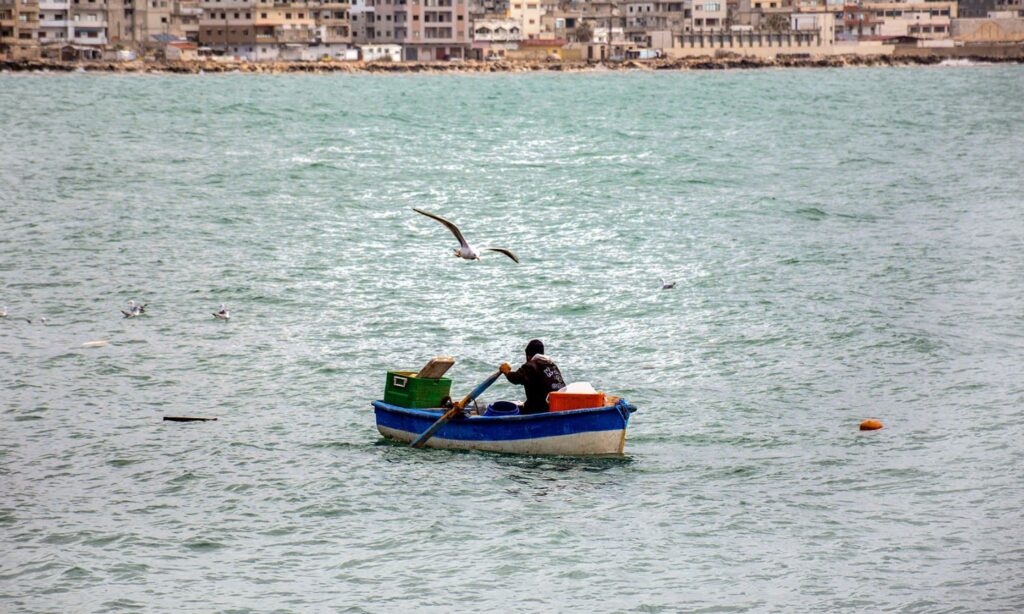Latakia – Linda Ali
At 75 years old, Abu Firas cannot remember the last time he ate fish—perhaps two years ago, maybe more. Living in the village of al-Qanjara near the coast of Latakia, he can barely afford his daily expenses, let alone think about buying fish. “How can I think about buying fish?” he asks.
Abu Firas follows the news about the recent catch of Palamida fish by fishermen in Tartus governorate, where the price dropped to 25,000 Syrian pounds, while in his own governorate (Latakia), it remains at 55,000 pounds (with 1 USD equaling 14,900 Syrian pounds).
Despite Palamida being among the less favored types of fish due to its tough meat, its price is still high. Popular belief says, “Whoever eats Palamida won’t eat it again,” referring to its poor taste compared to other types.
Fish prices in Latakia have notably increased compared to the beginning of the fishing season, which peaks in early spring and continues throughout the summer, declining in winter due to weather conditions.
Even though it is currently fishing season, fish prices remain high in Latakia. A tour of the city’s market shows fish prices ranging from 55,000 to 250,000 pounds, depending on the type and size.
“My child wants fish”
Hanan feels a deep sadness whenever her five-year-old son asks for fish, especially after tasting it for the first time during a visit to his maternal relatives in rural Latakia in the last week of April.
Hanan, a housewife, says she and her husband respond to their son’s request with jokes and promises.
Most children in Latakia are not familiar with the taste of fish, largely because they have only eaten it a few times in their lives. Due to the high cost and poor economic conditions, most families cannot regularly consume all types of meat, including fish, and instead turn to seasonal vegetables due to their lower cost.
The minimum government salary in regime-controlled areas is 279,000 Syrian pounds (18.7 USD), while the average cost of living for a Syrian family of five has risen to about 12.5 million Syrian pounds. The minimum cost is 7.8 million pounds, according to the Kassioun Cost of Living Index at the end of last March.
Diesel is a reason, Fishing trip costs
Regarding the reason for the increase in fish prices, a vendor in Jableh fish market stated that the least expensive fishing trip costs fishermen more than 400,000 pounds since they buy diesel at the unsubsidized price, averaging 15,000 pounds per liter.
Fishing costs also include repairing nets after each trip, maintaining boats and vessels, and the fatigue and risks fishermen face while out at sea all night.
Fadi, a 48-year-old fisherman from Latakia, believes that fish prices are cheap compared to red meat and chicken prices, as well as production costs. He elaborates on the daily costs he incurs on fishing trips, which start at sunset and continue until the following sunrise.
One trip requires a “jerrycan” (20 liters) of diesel costing 300,000 Syrian pounds. Including equipment repair costs after each trip, daily expenses total about 400,000 pounds.
For the past five days, Fadi has not caught enough fish to cover his daily losses. Fishing is a game of luck for those using lines, which are currently the cheapest fishing tools.
Fadi cannot afford to buy fishing nets, with a single 50-meter net costing 1.1 million pounds. To use this method, he would need at least 20 nets, costing around 22 million pounds.
He has incurred losses of about 800,000 pounds and would need three full days of good luck to catch enough fish to recoup his losses.
The boat requires monthly oil changes costing 600,000 Syrian pounds, according to Fadi. A fisherman needs to earn between 800,000 to 1 million pounds daily to cover costs and still have money left for household expenses.
Globally, the average fish consumption per person is over 20 kilograms annually, while it does not exceed one kilogram per Syrian citizen, according to the government Tishreen newspaper in October 2023.

